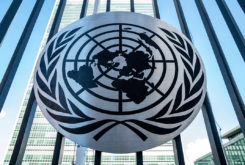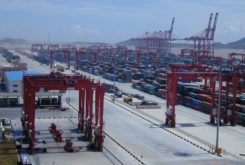Keeping with the political tradition that a new Government in Sao Tome and Principe replaces the leadership of state companies and agencies, the MLSTP-PSD executive, that replaced that of Patrice Trovoada, has quickly installed executives of its confidence and, in many cases, political family.
After forming its Government in December 2018, with the support of the the MDFM/ PCD/ UDD coalition, prime-minister Jorge Bom Jesus (MLSTP-PSD) has “swept” the boards of the most important state entities, including those of the National Civil Aviation Institute (INAC) and the General Regulatory Agency (AGER), as well as the National Petroleum Agency (ANP), where Olegário Tiny replaced Orlando Pontes.
The first wave of replacements, shortly after the inauguration of the new Government, reached the coveted, despite loss-making, state-owned companies, namely: Water and Electricity Company (EMAE), Air Navigation Company (ENASA) and Airports and Ports Administration Company (ENAPORT).
The replacement of central bank (BCSTP) governor, Hélio Almeida by Américo Barros, one of the vice presidents of the MLSTP-PSD, generated a dispute with president Evaristo de Carvalho (EC), who delayed the promulgation of the Government’s resolution (implicit veto).
The Government reacted by publishing a resolution that appointed and inaugurated the new governor, and the team of administrators was subsequently invested, leading the president to accuse the Government of usurping his powers, thus avoiding the already tense reactions with the president, elected with support from ADI.
While many of the board members removed belonged to the ADI, Patrice Trovoada´s party that lost the 2018 elections, many of those now appointed are militants, sympathizers or figures linked to the parties that make up the new majority.
Public media was one of the sectors that the opposition believed to be more under control of Patrice Trovoada, and new director of the National Radio (RNSTP), Silvério Amorim, is an MLSTP-PSD militant.
In addition to the substitutions in top positions, appointments are taking place at the departmental and lower levels.
The new president of the National Assembly, Delfim Neves, surprised by keeping the team of his predecessor José Diogo, including the personal secretary and press chief Swaílis Dendê, very close to the former PM and a master of ceremonies at his campaign rallies.
Public administration is the main source of employment in the archipelago, and appointments in this sphere often represent a way of rewarding partisan loyalty and commitment in electoral campaigns.
The most recent distribution of positions has been criticized by ADI militants, but Trovoada was one of the major promoters of the reality of the distribution of public offices by party leaders and militants.
Trovoada´s governments also introduced previously unobserved practices, such as requiring a militant card from a candidate for a public administration function, including at the most basic level.
The number of civil service cadres is disproportionate to the population of the archipelago, and leadership positions are relatively few for high demand, leading each new government to remove officials formerly placed by other parties.
In his address on the State of the Nation, Bom Jesus announced that the Public Administration currently has around 11,000 people. In 2014, when the government of Gabriel Costa ceased functions, the number of civil servants was around 6,000.
The situation of political clientelism lies in the lack of a private sector capable of generating employment opportunities, as well as of an effective diversification of the economy.
MLSTP-PSD, Sao Tome e Principe´s independence party, has close historical ties to China´s Communist party.
The political scene of Sao Tome e Principe, Macao Forum´s youngest member, has been determined essentially by two political families, often at odds – that of former president and MLSTP-PSD historical leader Manuel Pinto da Costa, a close ally of China, and that of Patrice´s father, Miguel Trovoada, both of whom were behind the creation of a new party, ADI.
It was during the presidency of Miguel Trovoada – and while Patrice was an adviser to the president – that diplomatic ties with PR China were severed (in 1997) and established with Taiwan, a situation that lasted until the end of 2016.
Again under direct influence of Patrice, ties with China were reestablished in 2017, but, according to our sources in Sao Tome, the relationship between the former prime minister and Chinese diplomacy was one of low trust.
The positive electoral result achieved by the MLSTP-PSD was more of ADI’s demerits and less of its own merits: the climate of popular dissatisfaction marked by increasingly severe restrictions on energy supply, but also by commodity shortages (rice) in the market, also disfavored ADI and the government – generally considered responsible.
The decision by Patrice´s Government to restore diplomatic relations with China was taken under pressure by the country’s difficult economic and financial situation, a fact acknowledged by Patrice Trovoada himself.
In 2017, Patrice expected to boost the economy with Chinese financial support to launch infrastructure projects, namely investments of USD 200 million for airport expansion, with a further USD 800 million for the deepwater port and USD 100 million to rehabilitate the road network.
But these expectations were frustrated shortly after the signing of the cooperation agreement with PR China in Apr.2017, with a more cautious Chinese approach than expected, regarding the government’s initial aspirations.
According to Osvaldo Abreu, the new Minister of Public Works and Infrastructure, negotiations are very advanced with Chinese companies for the construction of a commercial port in the region of Fernão Dias, in cooperation not only with China, but also the World Bank and the IMF.
Quoted by Macauhub, Abreu said the project for the “multi-functional commercial port” allows for the incorporation of a fishing component, as well as commercial and containers, and even energy production.
This new type of infrastructure is, according to Abreu, adaptable to the realities of Sao Tome and its commercial positioning in the African coast.(CLBrief)



